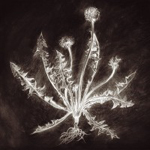|
|
 |
Dusted Reviews
Artist: Scott Tuma Album: Dandelion Label: Digitalis Review date: Feb. 1, 2011 |

|
|
|
 |
It’s been roughly a decade since Scott Tuma played guitar in Souled American, the cultish alt.Americana outfit whose unstrung country blues inspired, among other things, Camden Joy’s “Fifty Posters About Souled American” project (and a cameo in Jonathan Lethem’s Chronic City). Since then, Tuma has contributed to the ambient explorations of the Boxhead Ensemble and, with members of Zelienople, to Good Stuff House. He has also released four solo albums that warp familiar, organic sounds into strange dream-like shapes. His latest, Dandelion, came out as a limited edition vinyl release roughly a year ago. The CD version adds 35 minutes of material to the original.
Listening to Dandelion is much like wandering through someone else’s subconscious, brushing past fragments of melody, mood and evocation as you move from room to room. Tuma’s trick is to make deeply familiar sounds – a music box, a few guitar chords, the plink of banjo – sound mysterious, meaningful and, perhaps, a bit frightening. The music box that plays gently in “San Luis Free 2E” is fraught with emotion, a scrap of memory that evokes childhood innocence, even while surrounding it with an ominous hiss. Likewise, “Old Woman” submerges the strum of guitar in cloudy overtones, dissonance building a wall between the listener and the resolution he or she seeks. There’s a sense of loss as familiar, well-loved sounds recede into the distance.
Consider, for instance, the lovely “Roses are Red,” which closes the vinyl version, and comes just before the additional material on the CD. Here, Tuma hews fairly close to conventional acoustic blues, picking radiant, slow-moving patterns that might remind listeners of Loren Mazzacane Conors. There’s a certain amount of hiss and distortion at the back of this track, and an irregularly timed, sporadic clacking sound that seems unattached to the guitar melody. Yet even here, in what is possibly, the most accessible, least altered song, you have a sense of separation, as if you are not hearing so much the melody as the idea of the melody (which reminds you of other melodies now forgotten). There’s a melancholy in this track, a ghostliness, that is as much about human transience and memory as it is about the beauty of the sound.
All of these tracks are beautiful, but not all are as serene as “Roses are Red.” The long “Free Dirt” edges into harsher, more confrontational textures, letting swarms of overtones buzz over its contours. Somber, anxious and haunted, the sound builds and recedes in waves, cymbal rolls cresting over a mesh of conflicting tones. A clarity emerges finally, towards the end, a ghostly campfire song glimpsed in snatches through the murk and turmoil of distortion.
The art for this album shows one of the world’s commonest weeds, outlined in spectral white and transformed into something surreal and evocative. Likewise in the music, Tuma turns the most plainspoken of sounds into mysteries, encasing them with echo, contradicting them with overtones and putting them just out of easy reach.
By Jennifer Kelly
|







